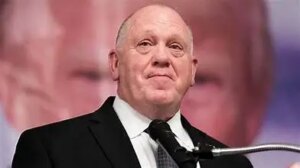The Tensions of Sanctuary Cities: A Deep Dive into Immigration, Policy, and Civil Unrest

Tom Homan, Border Czar, stands at the intersection of immigration policy and civil unrest.
As the migration crisis continues to escalate in urban centers across America, sanctuary cities are finding themselves in a precarious position. The ever-increasing influx of migrants has overwhelmed local resources, including shelters and healthcare systems. Cities like Denver are now at a crossroads, torn between their welcoming stances and the practical challenges they face.
A Call for Federal Assistance
Sanctuary cities have long prided themselves on being havens for migrants, but the reality of managing such large populations has proved daunting. Local leaders, including Denver Mayor Mike Johnston, have publicly expressed their difficulties, pleading with the federal government for timely assistance. The situation is pressing, yet many mayors remain steadfast in their commitment against federal deportation efforts, particularly those championed by former President Trump.
Johnston’s comments likened potential deportation efforts to a “Tiananmen Square moment,” suggesting that opposition would galvanize large segments of the local population—potentially resulting in significant civil unrest. “More than us having DPD stationed at the county line to keep them out,” Johnston remarked, “you would have 50,000 Denverites there.” His steadfast stance hints at a narrative emerging in these cities: a growing resistance to federal immigration policies deemed harsh by local leaders.
The Counterpoint: Law Enforcement’s Role
Enter Tom Homan, the newly-appointed Border Czar, who argues that compliance with federal law is paramount. His interpretation of immigration statutes—specifically Title 8, United States Code, 1324, which states that knowingly harboring undocumented immigrants is a felony—positions him at odds with sanctuary city policies. Homan has made it clear that he’s willing to enforce the law rigorously, stating, “If you come for my people, you come through me,” referring not only to local leaders but also to those who hide illegal immigrants.
Homan’s readiness to act has raised eyebrows in sanctuary cities where local leaders have promised to defy deportation orders. The fiery rhetoric serves to underscore the substantial divide between federal immigration policy and local governance, creating a tense atmosphere ripe for conflict.
A Forecast of Civil Unrest
As we look ahead, our economic and political models indicate heightened volatility during the upcoming months, particularly surrounding pivotal dates such as Inauguration Day. Recent rhetoric from left-leaning groups suggests that large protests are imminent, further heightening the potential for unrest. In an era marked by intense political polarization, even the suggestion of forceful deportation efforts could ignite protests that could draw national attention.
This dynamic reflects a broader trend we observe in contemporary politics: the stark contrast between the political will of voters and the actions of their elected officials. President Trump’s administration focused on immigration as a core issue, highlighting the public sentiment that security and order are paramount. Yet, those advocating for more lenient policies are often quick to label opposing views as draconian.
Seeking a Balanced Perspective
At Extreme Investor Network, we believe it’s crucial to analyze both sides of this multifaceted issue. The tension between sanctuary policies and federal immigration enforcement mirrors broader sociopolitical trends affecting our economy and society. It’s imperative for readers to understand how these conflicts impact local economies, social services, and ultimately, our national identity.
Our ongoing coverage will continue to explore these dynamics, shedding light on the economic implications of immigration policies, civic responses, and the potential ramifications for investment landscapes.
As we navigate these complex issues, we encourage our audience to engage in informed discussions and advocate for policies that reflect the needs and desires of their communities. It’s not just about politics; it’s about the lives affected and the future we forge together.
Stay tuned to Extreme Investor Network as we continue to provide you with insights that matter, ensuring you are well-informed and prepared for what lies ahead in the evolving landscape of American immigration and policy.

